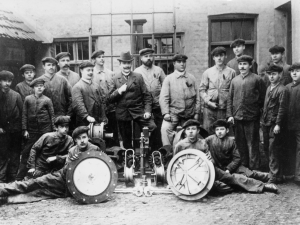Ellis Island, New York, U.S.A., December, 1919.
Introduction
With pencil and scraps of paper concealed behind the persons of friends who had come to say good-bye at the Ellis Island Dep334
Alexander Berkman and Emma Goldman
Ellis Island, New York, U.S.A., December, 1919.
Introduction
With pencil and scraps of paper concealed behind the persons of friends who had come to say good-bye at the Ellis Island Deportation Station, Alexander Berkman hastily scribbled the last lines of this pamphlet.
I think it is the best introduction to this pamphlet to say that before its writing was finished the rulers of America began deporting men directly and obviously for the offense of striking against the industrial owners of America.
The “Red Ark” is gone. In the darkness of early morning it slipped away, leaving behind many wives and children destitute of support. They were denied even the knowledge of the sailing of the ship, denied the right of farewell to the husbands and fathers they may never see again. After the boat was gone, women and children came to the dock to visit the prisoners, bringing such little comforts as are known to the working class, seedy overcoats for the Russian winter, cheap gloves and odds and ends of food. They were told that the ship was gone. The refined cruelty of the thing was too much for them; they stormed the ferry-house, broke a window, screamed and cried, and were driven away by soldiers
The “Red Ark” will loom big in American history. It is the first picturesque incident of the beginning effort of the War Millionaires to crush the soul of America and insure the safety of the dollars they have looted over the graves of Europe and through the deaths of the quarter million soldier boys whom American mothers now mourn.
Yes, the “Red Ark” will go into history. Alexander Berkman and Emma Goldman whom the screaming harlots of the yellow press have chosen to call the “leaders” of those whose distinction is that they have no leaders, are more fortunate than otherwise. Berkman and Goldman have been deported as “Russians.” They were born in Russia, but they did their thirty years’ work of en, enlightenment in this, our America. I think they are therefore Americans, in the best sense, and the best of Americans. They fought for the elementary rights of men, here in our country when others of us were afraid to speak, or would not pay the price. In all the leading cities of this land, they have contributed to the intellectual life of the younger, aspiring generation. I venture to say that there is hardly a liberal in the United States whose life has not been influenced directly or indirectly and made better, by Alexander Berkman and Emma Goldman.
Alexander Berkman spent in American prisons more years than like to remember. He did it deliberately. He did it for the welfare of men, and the American portion of mankind. He never hesitated to offer his life for his brother. I recall a picture; it is in Russia. We were gathered in Moscow. It looked as though the Revolution were going to its death. Everywhere the Soviet armies Were retreating, the masses were sinking into despair, the German working class was not rising in rebellion as we had hoped, the Austrians likewise; the White Terror was raising its head through. out Russia. A pallid girl, a Russian-American immigrant returned to her native country, held in her hand the bulletin of the day’s news. “A hundred Alexander Berkmans distributed throughout Europe at this time, and the history of Europe would be different!” she exclaimed.
Berkman wrote a book, “Prison Memoirs of an Anarchist,” which is one of America’s vital literary products. It won for him the admiration of such intellectuals here as had the courage to admire.
The “intellectuals” for the most part did not bid Emma Goldman and Alexander Berkman good-bye. Most of those who dared to visit the passengers of the “Red Ark” in their Ellis Island prison were young men and women of the working class. That is as it should be. It is in the working class where Goldman and Berkman’s brave work will find the growth that will count. American plutocracy knew this. That is why American plutocracy deported Alexander Berkman and Emma Goldman.
This pamphlet is the “good-bye message” of Alexander Berkman and Emma Goldman; and I think it is in spirit the message of all the passengers of the “Red Ark.” As such it appears first in this form and will appear later in history. Read it and keep it for the future.
Robert Minor
Deportation — Its Meaning and Menace
I
The war is over, but peace there is not. On a score of fronts human slaughter is going on as before; men, women, and children are dying by the hundred thousands because of the blockade of Russia; the “small nations” are still under the iron heel of the foreign oppressor; Ireland, India, Egypt, Persia, Korea, and numerous other peoples, are being decimated and exploited even more ruthlessly than before the advent of the- Great Prophet of World Democracy; “self-determination” has become a by-word, nay a crime, and world-wide imperialism has gotten a strangle hold upon humanity.
What, then, has the Great War accomplished? To what purpose the sacrifice of millions of human lives, the unnamable loss in blood and treasure? What, especially, has happened in these United States?
Continue reading Deportation — Its Meaning and Menace: Last Message to the People of America →









